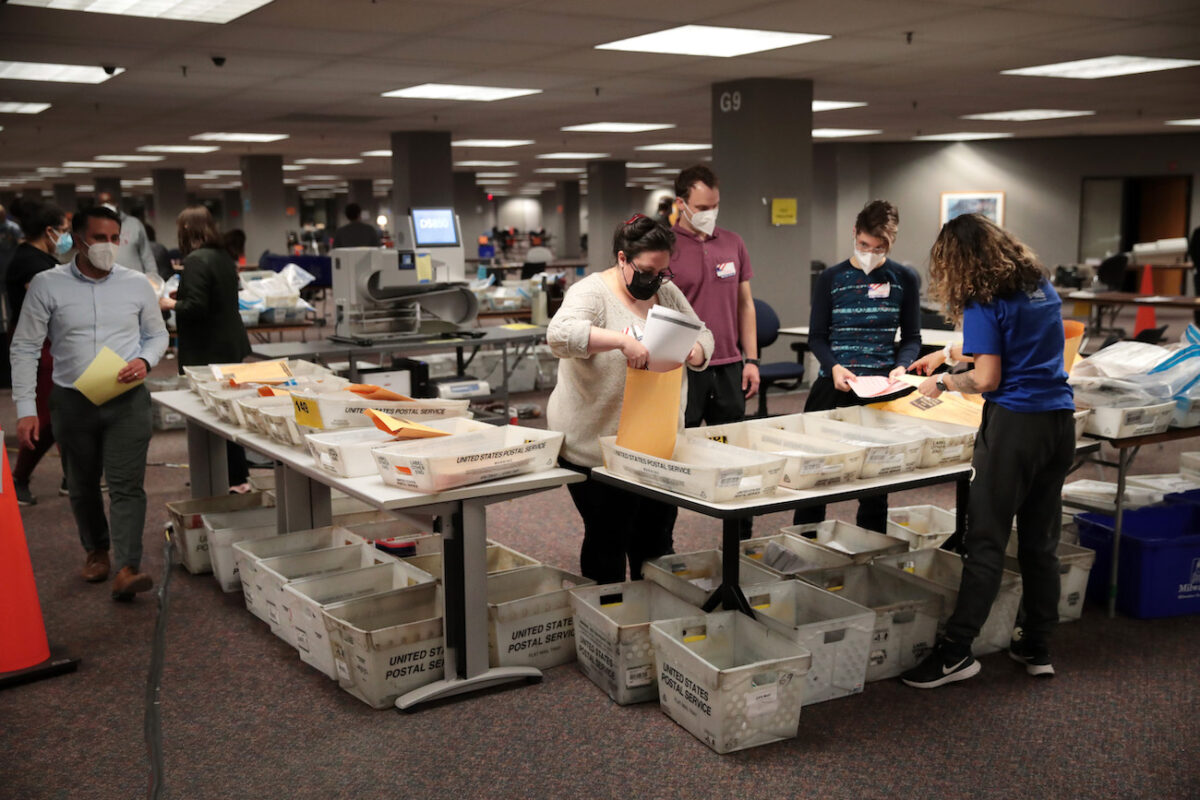Election Fraud Issues Are Not Limited to Swing States
CommentaryDespite 20 months of nonstop Democrat and sycophantic media claims that “the 2020 election was the most secure in American history,” shocking evidence of election integrity failures continues to be exposed in several states. Some examples: On Sept. 21, Fulton County (Pennsylvania) filed a “breach of contract” lawsuit against Dominion Voting Systems based on a report that determined that the county’s log files contain “an external IP address” located in Quebec, Canada, and that an unauthorized “python script” had been installed after the certification date. The Epoch Times reported on Sept. 22 that a watchdog group reported 350,000 inaccuracies in Wisconsin’s voter roll, including “12,555 registered voters’ addresses [in Milwaukee County that] are listed as vacant by the U.S. Postal Service.” An election security forum, held on July 29 in Maricopa County, disclosed the names of the election workers who illegally deleted elections files from the Elections Management Server in April 2021 in defiance of a subpoena from the Arizona state senate. Gregory Stenstrom, a certified poll watcher for 36 precincts in Pennsylvania during the 2020 election, gave a firsthand account of how the 2020 election was stolen in Delaware County by a cabal of Democrat activists and establishment GOP politicians in a new book he co-authored, titled “The Parallel Election.” According to The Gateway Pundit, “Dominion Voting machines in El Paso County, Colorado, have reportedly produced large numbers of adjudications in their Logic and Accuracy test for the upcoming hand recount of the 2022 Primary election.” An independent journalist personally witnessed and recorded (via video/picture) suspected fraud at Colorado’s El Paso County Clerk and Recorder office during the machine recount process of the primary election that was conducted on July 31. Republican Party organizations in various states have voted to reject and rescind the 2020 election because it was “fraudulent and stolen,” including the Texas GOP (during their state convention), Cass County and Alcona County GOP in Michigan, the Maricopa County GOP, Arizona GOP, Montana GOP, and several Wisconsin counties. As previously reported by The Epoch Times, the Election Integrity Network has “developed into a nationwide mobilization base and knowledge-sharing platform that operates at national, state, and local levels to work on election integrity initiatives, such as pushing legislation for voting security, hiring more poll watchers and election officials, and examining potential loopholes in election administration processes.” No wonder there is traction across the United States on local election integrity efforts! And then, there are these results from a nationwide Rasmussen poll on election integrity that indicate that election integrity concerns are very important to voters in the run-up to the midterm elections in November: Fifty-two percent “of Likely U.S. voters believe it is at least somewhat likely that cheating affected the outcome of the 2020 presidential election.” Fifty percent “think it is at least somewhat likely there will be widespread cheating that will affect the outcome” of the midterm elections. Fifty-eight percent “think it’s at least somewhat likely that wider use of mail-in voting will lead to more cheating in elections.” “President Joe Biden’s strongest supporters are least concerned about cheating in elections.” That last bullet point is no surprise, as election lawyers from the Democrat National Committee have sued to prevent state audits since November 2020. One wonders: if the Democrats truly believed that the 2020 election “was the most secure in American history,” then they would be only too happy to conduct a few audits to prove that to the American people. Election officials count absentee ballots in Milwaukee, Wis., on Nov. 4, 2020. (Scott Olson/Getty Images) Lastly, The Federalist reported how swing states did not follow their election laws in 2020, such as expanding drop boxes, which fueled ballot harvesting. But it is not just swing states that had problems. And there are other election integrity/fraud issues besides bad registration rolls, illegal drop boxes, and failure of election machines’ logic and accuracy tests. Take, for example, the novel way to steal a local election that was recently uncovered by a citizen’s election integrity group in South Dakota called South Dakota Canvassing Group (SD Canvass). At a press conference on Sept. 20 in Sioux Falls, SD Canvass disclosed findings from local canvassing in South Dakota, including hundreds of signed affidavits by registered voters indicating ghost votes, lost votes, and stolen votes. A key disclosure centered around a mail-forwarding operation that appears to have been used to pad votes for a county official. Bruce Kjetland, a county commissioner in Hanson County, has allegedly been running a mail-forwarding business to collect personal information from peop

Commentary
Despite 20 months of nonstop Democrat and sycophantic media claims that “the 2020 election was the most secure in American history,” shocking evidence of election integrity failures continues to be exposed in several states.
Some examples:
On Sept. 21, Fulton County (Pennsylvania) filed a “breach of contract” lawsuit against Dominion Voting Systems based on a report that determined that the county’s log files contain “an external IP address” located in Quebec, Canada, and that an unauthorized “python script” had been installed after the certification date.
The Epoch Times reported on Sept. 22 that a watchdog group reported 350,000 inaccuracies in Wisconsin’s voter roll, including “12,555 registered voters’ addresses [in Milwaukee County that] are listed as vacant by the U.S. Postal Service.”
An election security forum, held on July 29 in Maricopa County, disclosed the names of the election workers who illegally deleted elections files from the Elections Management Server in April 2021 in defiance of a subpoena from the Arizona state senate.
Gregory Stenstrom, a certified poll watcher for 36 precincts in Pennsylvania during the 2020 election, gave a firsthand account of how the 2020 election was stolen in Delaware County by a cabal of Democrat activists and establishment GOP politicians in a new book he co-authored, titled “The Parallel Election.”
According to The Gateway Pundit, “Dominion Voting machines in El Paso County, Colorado, have reportedly produced large numbers of adjudications in their Logic and Accuracy test for the upcoming hand recount of the 2022 Primary election.”
An independent journalist personally witnessed and recorded (via video/picture) suspected fraud at Colorado’s El Paso County Clerk and Recorder office during the machine recount process of the primary election that was conducted on July 31.
Republican Party organizations in various states have voted to reject and rescind the 2020 election because it was “fraudulent and stolen,” including the Texas GOP (during their state convention), Cass County and Alcona County GOP in Michigan, the Maricopa County GOP, Arizona GOP, Montana GOP, and several Wisconsin counties.
As previously reported by The Epoch Times, the Election Integrity Network has “developed into a nationwide mobilization base and knowledge-sharing platform that operates at national, state, and local levels to work on election integrity initiatives, such as pushing legislation for voting security, hiring more poll watchers and election officials, and examining potential loopholes in election administration processes.”
No wonder there is traction across the United States on local election integrity efforts! And then, there are these results from a nationwide Rasmussen poll on election integrity that indicate that election integrity concerns are very important to voters in the run-up to the midterm elections in November:
- Fifty-two percent “of Likely U.S. voters believe it is at least somewhat likely that cheating affected the outcome of the 2020 presidential election.”
- Fifty percent “think it is at least somewhat likely there will be widespread cheating that will affect the outcome” of the midterm elections.
- Fifty-eight percent “think it’s at least somewhat likely that wider use of mail-in voting will lead to more cheating in elections.”
- “President Joe Biden’s strongest supporters are least concerned about cheating in elections.”
That last bullet point is no surprise, as election lawyers from the Democrat National Committee have sued to prevent state audits since November 2020. One wonders: if the Democrats truly believed that the 2020 election “was the most secure in American history,” then they would be only too happy to conduct a few audits to prove that to the American people.

Lastly, The Federalist reported how swing states did not follow their election laws in 2020, such as expanding drop boxes, which fueled ballot harvesting.
But it is not just swing states that had problems. And there are other election integrity/fraud issues besides bad registration rolls, illegal drop boxes, and failure of election machines’ logic and accuracy tests.
Take, for example, the novel way to steal a local election that was recently uncovered by a citizen’s election integrity group in South Dakota called South Dakota Canvassing Group (SD Canvass).
At a press conference on Sept. 20 in Sioux Falls, SD Canvass disclosed findings from local canvassing in South Dakota, including hundreds of signed affidavits by registered voters indicating ghost votes, lost votes, and stolen votes. A key disclosure centered around a mail-forwarding operation that appears to have been used to pad votes for a county official.
Bruce Kjetland, a county commissioner in Hanson County, has allegedly been running a mail-forwarding business to collect personal information from people that may have been used to generate fraudulent absentee ballots from people who were not South Dakota residents.
A mail-forwarding operation is one in which an individual offers the use of a designated address—a business, residence, postal address—to out-of-staters interested in establishing a mailing address in a particular state for tax purposes and other reasons. For example, South Dakota has no state income tax, no personal property tax on vehicles, and no vehicle inspections are required.
Voter registration of these so-called motor-voters has been lightly enforced throughout the state. South Dakota’s voter registration form (downloadable here) contains these two key fields:
- “If Residence Address is a PO Box, rural box, or general delivery, you must give the location of your residence.”
- “I declare under penalty of perjury and (2 years imprisonment and $4,000 fine) that … I actually live at and have no intention of leaving the above address.”
Thus, any motor-voter who registers to vote in South Dakota must have a permanent South Dakota residence in order to do so. Furthermore, South Dakota state law (SDCL 12-4-7.2) states that the duty of the county auditor and other designated officials is to ensure that every block of the voter registration form is filled out completely.
The Hanson County commissioner was able to “sponsor” 1,454 registered voters from his mail-forwarding business address. Did those voters all have valid South Dakota residences?

Publicly available election information obtained from the Hanson County auditor showed that approximately 65 percent of the votes for Kjetland during the June primary election and November general election in 2020 were received from absentee ballots. Specifically, of the 199 total votes cast in the June 2022 primary election, 107 of the ballots cast came from Kjetland’s mail-forwarding business address located in Emery, South Dakota (population 540). Not coincidentally, Kjetland won his primary race over Travis Kamshoff 121-78.
With respect to the 2020 general election, the South Dakota secretary of state recorded 756 votes cast from that mail-forwarding address on Nov. 3, 2020 (of the 1,454 voters registered to that single address!). The voters who ostensibly voted from this address were subsequently canvassed by SD Canvass. Over 80 percent were not reachable by phone. The canvassing results:
- Ten voters stated that they did not vote in the 2020 election.
- Four voters are deceased.
- Two lost votes or cast a vote but had none recorded for them.
- Twenty-eight are not South Dakota residents and registered to vote in other states.
Affidavits have been subsequently received from people whose names were on those ballots who denied completing and mailing them in. These affidavits would appear to be clear evidence of election fraud.
In short, from the evidence collected by SD Canvass, Kjetland apparently perpetrated an election scheme that enabled him to sign and submit fraudulent absentee ballots and subsequently be illegally elected over the will of the people in his county.
The information collected by SD Canvass in Hanson County, as well as voter irregularities that were uncovered in several other counties, has been forwarded via the various county sheriffs to the South Dakota Division of Criminal Investigation for further investigation.
Concluding Thoughts
Based on continuing revelations surrounding election integrity in several states across the United States—including questions about voting irregularities during the 2020 elections and subsequent primary elections—polls continue to show that Americans remain concerned about election security issues in their states.
Regarding the mail-forwarding scheme uncovered by SD Canvass in Hanson County, what is the likelihood that that operation was/is a one-of-a-kind initiative that was only used in a tiny county in red state South Dakota? Slim and none.
Meanwhile, the Democrats (and others) continue to claim that 2020 was the most secure election ever. Riiiiiight.
Views expressed in this article are the opinions of the author and do not necessarily reflect the views of The Epoch Times.












